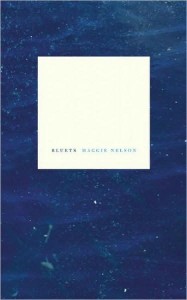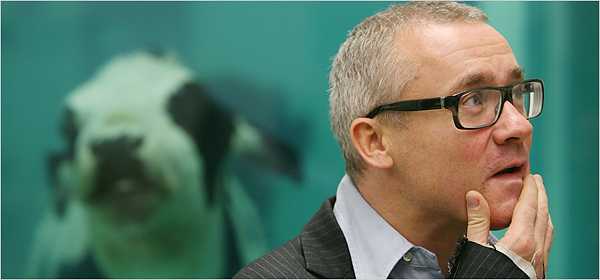1. Beecher’s Magazine is now available. Look at the list of contributors. I like how they show what’s poetry and what’s fiction.
2. Feast your eyes on the cover of Heather Christle’s new book, which will be available July 1:
1. Beecher’s Magazine is now available. Look at the list of contributors. I like how they show what’s poetry and what’s fiction.
2. Feast your eyes on the cover of Heather Christle’s new book, which will be available July 1:
To my mind, it lies in that blank residuum that I’m pursuing; and that must be beyond possibilities, because in the space of possibilities, Pierre Menard is doing nothing. He is doing totally zero, because in the space of possibilities the work exists, it’s Don Quixote, and he’s just copying it. If you believe in the metaphysics of possibility and probability, where everything is framed in identified states of the world, and so on, then Pierre Menard is doing nothing, totally nothing. Yet by reading Borges, you are really led to believe it possible that Pierre Menard has done something original; and the key thing to me is that what Pierre Menard has done is to write two chapters. He didn’t read them, he did’t just think of them. So, he really needed the material medium, the writing itself, in order to produce something that, when you read it, you say, well, although it’s the same — it has the same identity as Cervantes’ novel — it is materially a new work. And although my main object is the markets and finance, although that’s important and I identify the medium of contingency as the market in my specific case, in the end its generalization is also writing.
I also happen to be a writer, so I also speak for myself: writing, to me, is something that is beyond probability and ‘states of the world’. It’s something where the writer can really throw himself into a process of writing, blindly so to speak — and one of my favourite expressions is that he is then traversed by contingency, so he almost surprises himself with what he is writing. To me, that’s writing: even though you may have thought about it, and you had planned it, there are thoughts that you can only have through writing. I’m sure everyone has found that: there is no use really in planning in advance what you are going to write. Even if you do that, chances are that you’ll end up writing something completely different. I think that the true spark of writing comes when you find yourself surprised by what you have written; and I would even claim that there are thoughts that you can only have through the material process of writing.
So, writing to me is an attempt to get to that extraordinary or residual thing that surpasses probability and the states of the usual metaphysical conception; and which would allow us to twist chronology in such a way that, even though the event happens and it is only after the event that we can think it, somehow we establish communication with it outside time. Remember, I need to twist time itself in order to be able to predict the event ‘beforehand’, even though it has happened.
–Elie Ayache, “In the Middle of the Event” in The Medium of Contingency
In New York graffiti’s Golden Age, one of it’s most respected and prolific writers was—according to the eye witness account of another writer—a shy, eldery white woman who simply wanted everyone to accept Jesus. How will you spend your dotage?
Mulholland Drive, the TV pilot. From Mark Gluth (and the Dennis Cooper blog), Didion vs. Lynch.

They were selling everything, including the bookshelves. (This is how any number of blog posts begin.) There were people in large hooded sweatshirts on corners waving signs that said “80-90% off,” and, in the store’s windows, there were giant yellow banners saying the same thing. I went on the third to last day. Large sections of the store were roped off, like the cafe area and the music section (though that section had been irrelevant since 2005 anyways). People wandered around aimlessly, looking totally lost, which was really the only way to inhabit the store since the selection had been so thoroughly decimated it was impossible to look for anything specific.
 This is Part III in a series where I ask writers I like for 6 book recommendations according to some loose guideline. Part I is here; Part II is here. This week is another installment on nonfiction, this time brought to us by Maggie Nelson, author of Bluets (Wave Books), the forthcoming The Art of Cruelty: A Reckoning (Norton), and five other books of poetry, criticism, and essay.
This is Part III in a series where I ask writers I like for 6 book recommendations according to some loose guideline. Part I is here; Part II is here. This week is another installment on nonfiction, this time brought to us by Maggie Nelson, author of Bluets (Wave Books), the forthcoming The Art of Cruelty: A Reckoning (Norton), and five other books of poetry, criticism, and essay.Tight Times is a children’s book about a kid who wants a dog. His mom says don’t talk to her because she is busy. She wears a bra around the house. The family makes the kid eat a cereal called MR. BULK. Dad gets laid off and comes home and smokes a cigarette and makes a stiff drink. Mom tells the kid to stay outside. Kid finds a cat in a garbage can. Some nosy aging hipster woman stranger says he should just keep the cat. Parents say, fine, OK, keep the damn cat. Kid does so and names it Dog. Kid feeds Dog lima beans.
Vivisection is the controversial act of operating on a living animal. People have performed vivisection on humans, primarily as some demented form of medical “experimentation” or as torture. Anesthesia usually not applied during these surgeries. The term is also the title of a poetry chapbook by Eric Weinstein, winner of the 2010 New Michigan Press chapbook contest.

“Every day your relationship with death changes.”
“You’ve got to be oblivious to other people-the push and pull of other people’s opinions, the way other people measure success. It’s then that you realize you are 100 percent who you are and you have to use that who-you-are 100 percent in order to create great things. And that’s very difficult because everyone wants to be better than they are. You’ve really got to get down on the floor with yourself and get low in order to make great art. I think you’ve just got to accept who you are and do the most unbelievable things.”
“I sometimes feel that I have nothing to say and I want to communicate this.”
“Artists are like everybody else.”
“And I think, you know, I like it, so I can’t understand it, I think if you’re gonna have this stuff going in your ears, you might as well have some stuff going in your eyes.”
“I wanted a shark that’s big enough to eat you, and in a large enough amount of liquid so that you could imagine you were in there with it.”
“There’s always something you missed or something you didn’t notice or somehow you got wrong… I don’t really have a beginning.”
“Architects don’t build their own houses.”
“I always feel like the art’s there and I just see it, so it’s not really a lot of work.”
“I’m more interested in why people are frightened by Jaws and why Jaws was such a hit than saying Spielberg’s my main influence.”
“Sometimes when you’re drunk you can see better.”
“I always liked the fact that you get these totally unacceptable images, but they’re taken by a really expensive photographer, with great light, and in terms of the quality of the photograph it’s a great photograph, but in terms of imagery it’s unacceptable, and I like that contradiction.”
“People say to me that my work’s sensational. And I go, “What’s wrong with sensation? It’s like touching skin.” Sensation is an element of what I do, and why not? It’s not sensational for the sake of being sensational, but it’s sensational art.”
“I don’t think I invented anything. It’s like I just saw it, just because I did it first. The road was there. It was going to happen.”
“It’s good to have a title that’s not just one word. If you’re gonna title it, you might as well try and say something.”
“There’s no possible way you can get what you want.”
“The great thing about painting now is that I’ve gotten to the point where I can forget everything just by doing it. And I never used to be able to do that.”
“I just wanted to find out where the boundaries were. I’ve found out there aren’t any. I wanted to be stopped but no one will stop me.”
“I don’t mind if it falls over… if you break the glass you replace the glass, if the sheep falls out you can always get a new sheep.”
“Warhol said a brilliant thing. He said if anybody slags anything off, make more.”
This is an open call for a position as Reviews Editor of HTMLGiant. Responsibilities would include organizing regular posts and reading/selecting/soliciting incoming reviews. Modest monetary compensation. Interested parties please email blake [at] htmlgiant [dot] com with anything you think I should know. If you don’t hear back, we filled the spot. Thanks! Thanks to all who responded so fast. We got more than we expected. More soon.
For Short Story Month, Matt Bell has been posting reviews of short stories, guest posts, and quotations from renowned writers on the craft of short story writing. Yesterday, Bell wrote an amazing post about Eduoard Levé’s When I Look at a Strawberry, I Think of a Tongue which appeared in Paris Review 196. You should read both the excerpt (genre indeterminate, sort of, you’ll see) and Matt’s commentary.